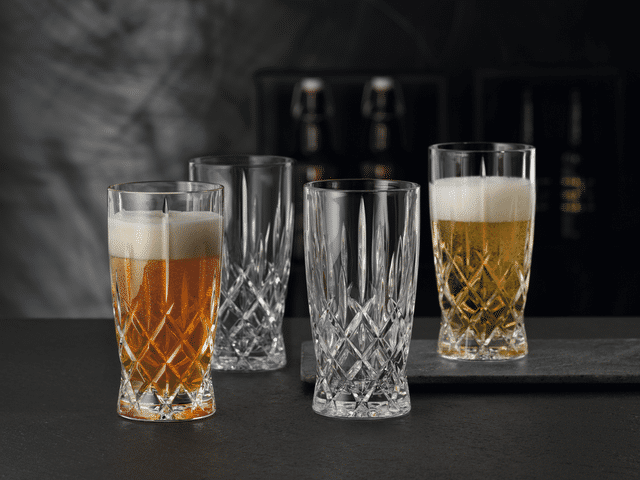O’zapft is!
The history of Oktoberfest

Each year, thousands of people descend upon Germany or get creative in their homes to mark the iconic Oktoberfest. Join us as we take you through the origins of this notable event, its significance in modern times, and how you can capture the spirit of Oktoberfest from the comfort of your own home.

What is Oktoberfest?
Oktoberfest is an annual celebration of Bavarian culture that has gained international recognition as one of the world's largest and most iconic beer festivals. Originating in Munich, Germany, Oktoberfest draws millions of visitors from around the globe to indulge in Bavarian traditions, music, and, of course, a wide variety of beers. However, while Oktoberfest is now widely thought of as a beer festival, it wasn't always that way...
The history of Oktoberfest
The origins of Oktoberfest trace back over 200 years to October 12, 1810, when Bavarian Crown Prince Ludwig (who would later become King Ludwig I) married Princess Therese of Saxony-Hildburghausen. The royal wedding was celebrated with a grand public gathering and horse races held on the fields in front of the city gates. These festivities were so well-received that the horse races were repeated in the following years, giving rise to the annual tradition that was initially named Theresienwiese after the grounds on which it took place.
As time went on, the event evolved. In 1818, agricultural shows started being included and by the late 19th century, amusement rides, carnival games, music and dancing, and beer stands had become integral parts of the celebration. As the event cemented itself as an annual celebration and developed a more global appeal, the name it was known by gradually shifted to Oktoberfest - although the event remains known locally as d'Wiesn.
Oktoberfest in the present day
Today, Oktoberfest has grown into a globally recognized event that attracts millions of people from around the world every year. While Munich remains the epicenter of Oktoberfest, celebrations for the festival now take place all over the world, underlining Oktoberfest’s modern status as a global event. The festival typically lasts 16 to 18 days, starting in late September and running through the first weekend in October. 2024’s Oktoberfest will last for 16 days, running from Saturday, 21st of September, until Sunday, 6th of October.
The heart of modern Oktoberfest celebrations is the beer tents, where a diverse selection of traditional German beers flow freely. In these tents, it's common to observe live music, traditional dances, and plenty of people donning their lederhosen and dirndls as they immerse themselves in the culture.
Capturing the Spirit of Oktoberfest from Your Home
There's no denying that heading to Munich for a celebration of the real thing is an opportunity to savor, but making this journey to experience Oktoberfest firsthand isn't possible for everyone. So, what better fix than to bring the spirit of Oktoberfest into your own home? Here's how you can create a mini-Oktoberfest experience without having to arrange travel to Munich:
Choose the right beers
For many, the critical feature of Oktoberfest is its exceptional range of quality beer offerings. Traditional German beers are the name of the game here. A few you might want to consider that really fit the bill include
- Märzen-style lagers - known for their rich, malty flavors and smooth finish.
- Bavarian Helles - a pale lager with balanced maltiness and moderate hop bitterness. It showcases a brilliant golden color with a creamy head, offering a smooth and crisp taste.
- Weissbier (Wheat Beer) - a signature Bavarian style. Weissbier is made with a substantial proportion of malted wheat, resulting in a hazy appearance and a light, fruity taste, often accompanied by notes of banana, clove, and other spices.
- Dunkel - meaning "dark" in German. Dunkel is a dark lager with a rich malt profile, including chocolate, toffee, and roasted grains flavors.
Check out our Bavarian beer blog for a more detailed account of Bavarian beers that will add authenticity to your home Oktoberfest celebrations.

Use appropriate glassware
With any drink, presentation matters, and for an authentic Oktoberfest experience, the recommended glassware for your German beer is a traditional German beer mug. These large, sturdy vessels feature a handle that allows you to enjoy your beer while maintaining a firm grip. As a nod to traditional German steins, we offer our Nachtmann Noblesse Beer Mug - a beer glass that marries tradition and modern day with its crystal glass structure, classic Bavarian-style beer handle, and signature Nachtmann Noblesse pattern.

Select suitable snacks
No Oktoberfest celebration is complete without delicious snacks to complement the beer. For an authentic German experience, opt for classic treats such as pretzels, sausages, and schnitzel. These hearty and flavorful dishes pair wonderfully with the malty profiles of the beers, enhancing the overall tasting experience.
Once you've got Oktoberfest's food and drink elements nailed down, remember to also focus on the other features that make up Oktoberfest. It may be partly about eating and drinking, but it's also about celebrating with friends and family, embracing the joyous atmosphere, and embracing Bavarian culture as a whole.
Oktoberfest is a centuries-old tradition that has evolved from its horse-racing origins into a global celebration of Bavarian culture, music, dance, and, of course, beer. With roots firmly planted in Munich, Oktoberfest's influence has spread far and wide, inspiring festivities globally. Whether you attend the grand event in Munich or celebrate from the comfort of your home, Oktoberfest offers a unique opportunity to immerse yourself in a rich cultural experience. So, don your lederhosen, raise your beer mug, and join in the merriment of Oktoberfest!
Locations